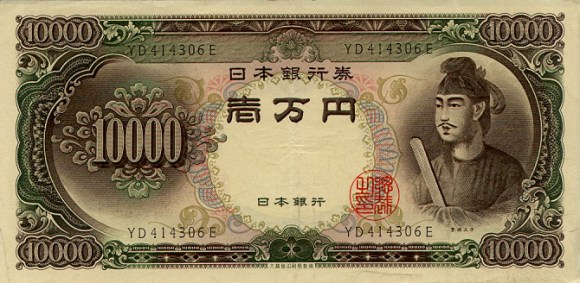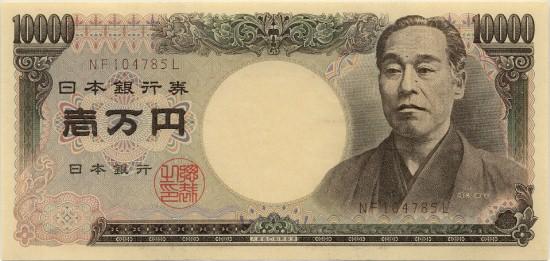
I’m sure I’m not the first to admit that life would be so much easier if money grew on trees, or even if earning more money were as simple as just printing it off your computer. But alas, the world does work that way, and anyone caught trying to spend counterfeit money is bound to end up in hot water, as these two Japanese suspects are sure to tell you.
Joint investigation headquarters of Osaka, Hyogo, and Niigata prefectural police announced this January 14 that company executives Takeshi Aoyama from Toyohashi City, and Masahiko Ito from Niigata City, were arrested under suspicion of importing forged money from China.
Just how much money, you ask? According to the reports, there were 108 10,000-yen bills. A 10,000-yen bill is the equivalent of a US hundred-dollar bill, so that’s about a cool US$10,800 in (fake) cash right there. And what was particularly interesting about these bills is that they were forgeries of the old-style 10,000-yen note.
The Bank of Japan’s homepage states that the old bills, first issued in 1958, featured Prince Shōtoku, a legendary regent and politician in late 6th century Japan. Prince Shōtoku was then replaced on the bills in 1984 by Yukichi Fukuzawa, famous philosopher and founder of Keio University.
▼The prince in all his glory…
▼…before Mr. Yukichi took over

Seventy-eight-year-old Aoyama and 44-year-old Ito are suspected of smuggling the old bills from Shanghai into Chubu Airport in Aichi Prefecture in June 2013. Investigations continued that July after old bills brought in to be exchanged at a bank in Niigata were found to be fake, and another fake bill was found listed on an online auction website.
When questioned, Aoyama claimed that he received over 200 of the bills from a Chinese man after paying him, and Ito adds that they didn’t know whether or not the bills were fake.
The two still took the money in to banks within the country to be exchanged, and also gave them to friends and acquaintances, persuading them that there were still many of the old bills in use in China, and encouraging them to invest the money.
Coincidentally enough, back in 2012, Aoyama and Ito established the “Nicchuu Rekishi Kouryuu Kyoukai“, with roughly translates as “Sino-Japanese Historical Exchange Association”. Aoyama states he was urged to establish the association by the same man who gave him the fake bills. Guess there was a bit more than just history being exchanged there?

If you don’t want to get in trouble with the big guys, it might be a good idea to keep the fake money for playtime!
Source: The Asahi Shimbun
Featured image: Wikipedia

 How to spot the new sophisticated counterfeit bills circulating in Japan
How to spot the new sophisticated counterfeit bills circulating in Japan The Bank of Japan is really jazzed up about the new 10,000 yen bill
The Bank of Japan is really jazzed up about the new 10,000 yen bill “They slipped 10,000-yen bills into rice balls” — Bizarre election corruption in Aomori revealed
“They slipped 10,000-yen bills into rice balls” — Bizarre election corruption in Aomori revealed It’s a hard rock life: NINGEN ISU’s Shinji Wajima talks about songwriting, working with friends
It’s a hard rock life: NINGEN ISU’s Shinji Wajima talks about songwriting, working with friends Man in Tokyo tries to pay for sex with toy check
Man in Tokyo tries to pay for sex with toy check Red light district sushi restaurant in Tokyo shows us just how wrong we were about it
Red light district sushi restaurant in Tokyo shows us just how wrong we were about it Tokyo Tsukiji fish market site to be redeveloped with 50,000-seat stadium, hotel, shopping center
Tokyo Tsukiji fish market site to be redeveloped with 50,000-seat stadium, hotel, shopping center Japanese ramen restaurants under pressure from new yen banknotes
Japanese ramen restaurants under pressure from new yen banknotes McDonald’s new Happy Meals offer up cute and practical Sanrio lifestyle goods
McDonald’s new Happy Meals offer up cute and practical Sanrio lifestyle goods Beautiful Red and Blue Star luxury trains set to be Japan’s new Hokkaido travel stars
Beautiful Red and Blue Star luxury trains set to be Japan’s new Hokkaido travel stars Pokémon Sleep camping suite and guestrooms coming to Tokyo Hyatt along with giant Snorlax burgers
Pokémon Sleep camping suite and guestrooms coming to Tokyo Hyatt along with giant Snorlax burgers Osaka’s creepy cute mascot speaks for first time, adds more fuel the creepy OR cute debate【Video】
Osaka’s creepy cute mascot speaks for first time, adds more fuel the creepy OR cute debate【Video】 French Fries Bread in Tokyo’s Shibuya becomes a hit on social media
French Fries Bread in Tokyo’s Shibuya becomes a hit on social media Mt. Koya planning to instate visitor’s tax to cope with huge tourist numbers
Mt. Koya planning to instate visitor’s tax to cope with huge tourist numbers Starbucks Japan adds a Motto Frappuccino to the menu for a limited time
Starbucks Japan adds a Motto Frappuccino to the menu for a limited time All-you-can-drink Starbucks and amazing views part of Tokyo’s new 170 meter-high sky lounge
All-you-can-drink Starbucks and amazing views part of Tokyo’s new 170 meter-high sky lounge More foreign tourists than ever before in history visited Japan last month
More foreign tourists than ever before in history visited Japan last month Studio Ghibli releases new action figures featuring Nausicaä of the Valley of the Wind characters
Studio Ghibli releases new action figures featuring Nausicaä of the Valley of the Wind characters New private rooms on Tokaido Shinkansen change the way we travel from Tokyo to Kyoto
New private rooms on Tokaido Shinkansen change the way we travel from Tokyo to Kyoto Starbucks reopens at Shibuya Scramble Crossing with new look and design concept
Starbucks reopens at Shibuya Scramble Crossing with new look and design concept Studio Ghibli glasses cases let anime characters keep an eye on your spectacles
Studio Ghibli glasses cases let anime characters keep an eye on your spectacles Beautiful Ghibli sealing wax kits let you create accessories and elegant letter decorations【Pics】
Beautiful Ghibli sealing wax kits let you create accessories and elegant letter decorations【Pics】 Studio Ghibli releases Kiki’s Delivery Service chocolate cake pouches in Japan
Studio Ghibli releases Kiki’s Delivery Service chocolate cake pouches in Japan New definition of “Japanese whiskey” goes into effect to prevent fakes from fooling overseas buyers
New definition of “Japanese whiskey” goes into effect to prevent fakes from fooling overseas buyers Our Japanese reporter visits Costco in the U.S., finds super American and very Japanese things
Our Japanese reporter visits Costco in the U.S., finds super American and very Japanese things Studio Ghibli unveils Mother’s Day gift set that captures the love in My Neighbour Totoro
Studio Ghibli unveils Mother’s Day gift set that captures the love in My Neighbour Totoro New Japanese KitKat flavour stars Sanrio characters, including Hello Kitty
New Japanese KitKat flavour stars Sanrio characters, including Hello Kitty New Pokémon cakes let you eat your way through Pikachu and all the Eevee evolutions
New Pokémon cakes let you eat your way through Pikachu and all the Eevee evolutions Disney princesses get official manga makeovers for Manga Princess Cafe opening in Tokyo
Disney princesses get official manga makeovers for Manga Princess Cafe opening in Tokyo Sales of Japan’s most convenient train ticket/shopping payment cards suspended indefinitely
Sales of Japan’s most convenient train ticket/shopping payment cards suspended indefinitely Sold-out Studio Ghibli desktop humidifiers are back so Totoro can help you through the dry season
Sold-out Studio Ghibli desktop humidifiers are back so Totoro can help you through the dry season Japanese government to make first change to romanization spelling rules since the 1950s
Japanese government to make first change to romanization spelling rules since the 1950s Ghibli founders Toshio Suzuki and Hayao Miyazaki contribute to Japanese whisky Totoro label design
Ghibli founders Toshio Suzuki and Hayao Miyazaki contribute to Japanese whisky Totoro label design Doraemon found buried at sea as scene from 1993 anime becomes real life【Photos】
Doraemon found buried at sea as scene from 1993 anime becomes real life【Photos】 Tokyo’s most famous Starbucks is closed
Tokyo’s most famous Starbucks is closed One Piece characters’ nationalities revealed, but fans have mixed opinions
One Piece characters’ nationalities revealed, but fans have mixed opinions We asked a Uniqlo employee what four things we should buy and their suggestions didn’t disappoint
We asked a Uniqlo employee what four things we should buy and their suggestions didn’t disappoint Princesses, fruits, and blacksmiths: Study reveals the 30 most unusual family names in Japan
Princesses, fruits, and blacksmiths: Study reveals the 30 most unusual family names in Japan Why was the 2,000-yen bill left out of Japan’s yen redesign, and how does it feel about the snub?
Why was the 2,000-yen bill left out of Japan’s yen redesign, and how does it feel about the snub? 7-year-old turns cash into “art”, parents decidedly unamused
7-year-old turns cash into “art”, parents decidedly unamused Another fake bank discovered in China, inability to withdraw money dead give-away
Another fake bank discovered in China, inability to withdraw money dead give-away Japanese woman seeks justice after buying four million-dollar bills from counterfeiters
Japanese woman seeks justice after buying four million-dollar bills from counterfeiters Miss & Mr. Aoyama Contest boasts stunning contestants, maybe the next generation of TV stars?
Miss & Mr. Aoyama Contest boasts stunning contestants, maybe the next generation of TV stars? Japan’s awesomely adorable cat pseudo-currency is actually usable at one very special place【Pics】
Japan’s awesomely adorable cat pseudo-currency is actually usable at one very special place【Pics】 Japan issuing beautiful new coins to celebrate Emperor Naruhito’s enthronement
Japan issuing beautiful new coins to celebrate Emperor Naruhito’s enthronement Man in Japan orders female store clerk to prostrate herself over misunderstanding with his change
Man in Japan orders female store clerk to prostrate herself over misunderstanding with his change Drunk customer who threw coins at Tokyo bento shop gets arrested
Drunk customer who threw coins at Tokyo bento shop gets arrested Japanese love hotel worker injured after two men run off without paying exorbitant bill
Japanese love hotel worker injured after two men run off without paying exorbitant bill Detective Conan manga creator works 20 hours per day, 5 days per week
Detective Conan manga creator works 20 hours per day, 5 days per week Facial correction app makes the world’s money funny
Facial correction app makes the world’s money funny Nagoya man goes to bars, shows everyone 20 million yen; you’ll totally believe what happens next
Nagoya man goes to bars, shows everyone 20 million yen; you’ll totally believe what happens next Small Hokkaido bookshop’s unique service is getting business from all over Japan
Small Hokkaido bookshop’s unique service is getting business from all over Japan Ritzy Japanese cop breaks Rolex wristwatch during arrest, sends suspect US$6,000 repair bill
Ritzy Japanese cop breaks Rolex wristwatch during arrest, sends suspect US$6,000 repair bill 23-year-old Tokyo policewoman falls in movie-style love with yakuza member, real life ensues
23-year-old Tokyo policewoman falls in movie-style love with yakuza member, real life ensues
Leave a Reply